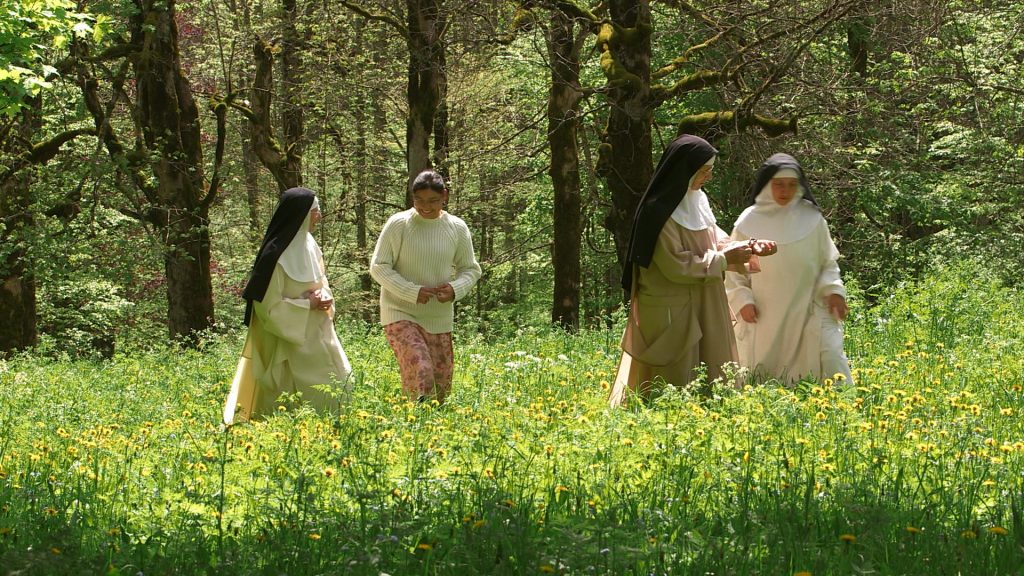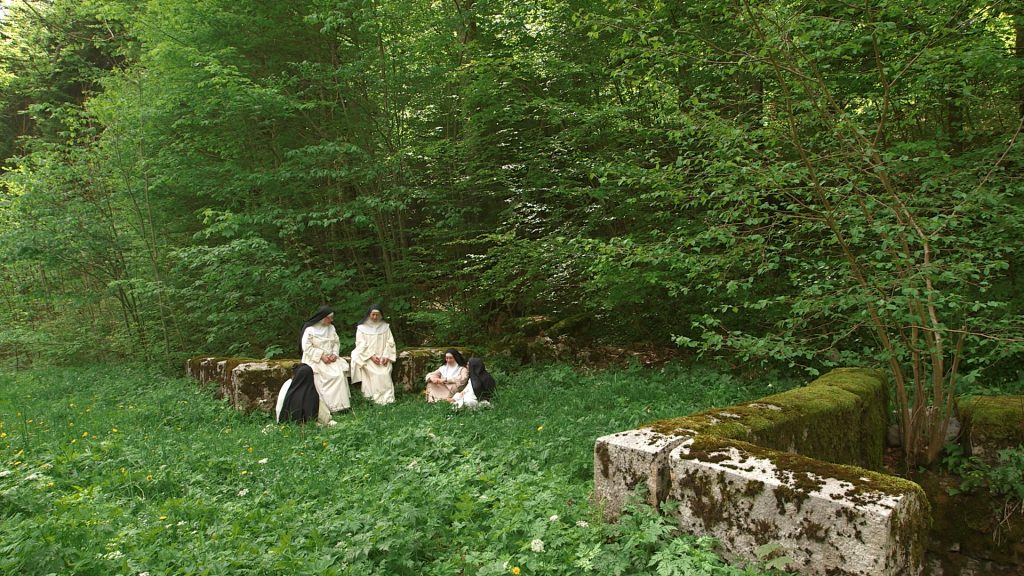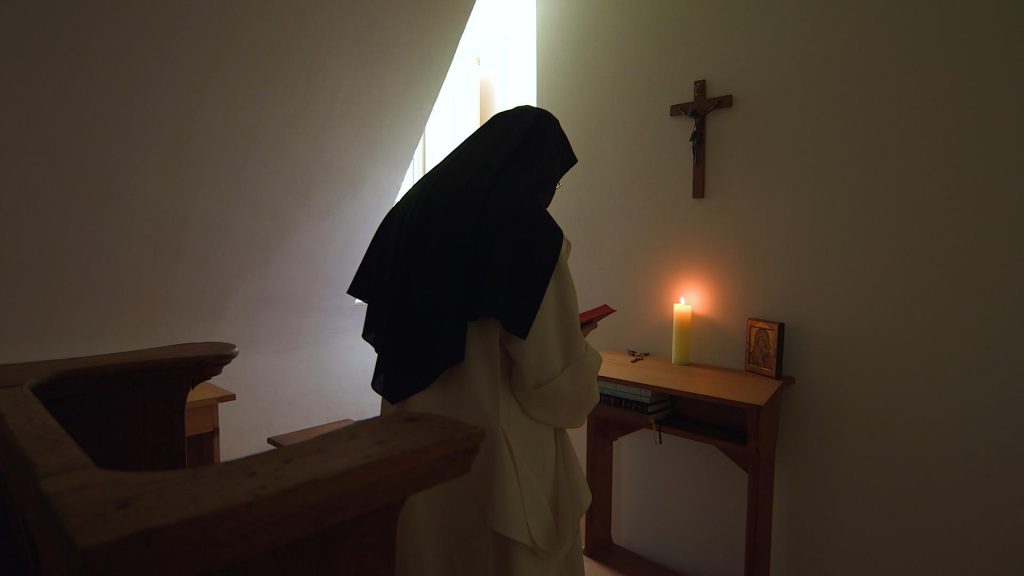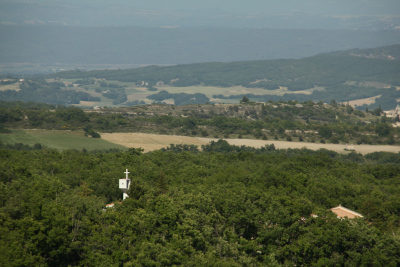1. The Desert
The Carthusian monks and nuns are called to seek God in solitude and silence as part of a small community that supports this search. Saint Bruno, burning with divine love, left the ephemeral things of the world to focus only on what is eternal. To bury yourself in a charterhouse, you must have the intimate certainty that within solitude hides an incomparable love, a love that cannot be surpassed by any other. In his letter to his friend Ralph, Saint Bruno described his experience of the desert:
Here men of strong will can enter into themselves and remain there as much as they like, diligently cultivating the seeds of virtue and eating the fruits of paradise with joy. Here they can acquire the eye that wounds the Bridegroom with love, by the limpidity of its gaze, and whose purity allows them to see God himself.
Here they can observe a busy leisure and rest in quiet activity. Here also God crowns his athletes for their stern struggle with the hoped-for reward: a peace unknown to the world and joy in the Holy Spirit.
The solitude and spirituality of the desert requires an effective separation from the world so that the life of prayer can flourish freely. For God seduced us and dragged us into the wilderness to speak to our hearts (Hos 2,16). Our solitude is protected by three ramparts both external and increasingly interior: the solitude of the desert, solitude within the enclosure and solitude in the secret of the cell.
This triple barrier is necessary for the nun to fully realize her deepest desire to become the adoring heart of the Church and the loving heart of humanity. In this solitary living environment she can offer to heaven praise to God and present the needs of her fellow men and women in the total gift of herself.
In referring to the geographical environment that surrounds and protects the solitude and silence of the Charterhouse, we like to speak of a “desert”. The charterhouses are located in places which are as isolated as possible, often mountainous and imbued with beauty. The desert separates, but it also brings life closer. God already speaks to us through the beauty of creation, which expands our hearts.
Every week, during the “spaciement” we take a long walk out of the monastery. We do not exceed the limits of what is considered our “desert”, but it can still be a good few kilometres!

2. The Cloister
Our strict enclosure is a symbol of the solitude we seek. The Carthusian nun does not have a mission to social service or education, nor even to the reception of visiting guests. She normally lives within the walls of the monastery, which is often several hectares in size. This separation from the world consists of living inside an enclosure from which she leaves only in exceptional circumstances, or for “spaciement”. This centuries-old custom is sanctioned by the Law of the Church. It is a “sacred place” that obviously signifies our belonging to the Lord alone (St. John Paul II, ‘The Consecrated Life’, No. 59). It can be seen as a return to the garden where the first man heard the voice of the Father (Gen 3,8), or as a return to the desert where the Lord called his prophet to show him his glory (1K 19.5-13). But it is also the garden of Gethsemane where the total gift of self takes place in the darkness (Mt 26,36-40), waiting for it to turn into the Easter garden where Jesus will call each by her name (Jn 20,11-18).
The enclosure creates a favourable environment (Cor Orans, no. 156) a privileged place of meeting, a way to live the Passover of the Lord and keep the heart constantly turned to Him.
In the charterhouse, the enclosure, with its separation from the world, leads to a great restriction vis-à-vis the means of social communication. We have no television or radio, and the use of the Internet, as well as the telephone, is reserved for nuns who have to perform this service in the monastery. Letter writing remains sober and limited to relatives. However, every year, for two days, we welcome them to the monastery’s guesthouse. Over time, either between ourselves or with our families, we usually experience a bond that because it is not nurtured by frequent contact, is deeper.

3. The cell
The hermitage or cell, is actually a small house with a garden. It is equipped with everything that is necessary for the nun to live and work alone and without the need to leave. This is the world of the Carthusian nun. Meals, sleep, work, reading, prayer usually take place no where else. It is the place of Presence, of solitary prayer, of solitary work…
Don’t the hours seem endless, the days seem tedious? They would be if the nun was alone with herself. She is not alone. She loves. She loves a God who is hidden, it’s true, but whose assured presence fills her with life and joy.
But if God seems to disappear, what will become of her? How can she bear the solitude, the desert? For him, she left everything, without him, left all alone she thirsts. Jesus lived in the desert by the power of the Spirit. Temptation beset him. He defeated it and he gives strength to the one who follows him. On his word and out of love the nun left everything. In his word and out of love she remains. She’s waiting for the day.
Her faith tells her that in the Bible God still speaks to her now. Christ in his Gospel. Christ in all his brothers, in all his sisters. She knows that the silence of Mary, who meditated on all things in her heart, is an inexhaustible source of light and strength. She helps her find God hidden in everyday life.
Everyday life? Throughout the day, just nothing: a work of sewing to do, a book to open, a meal to take. Simple, but God is here. There was nothing else in Nazareth’s workshop, only planks and chips, and God was there. With all her might, the nun believes him to be with her too. She gives all her attention to sewing, to the book, to the meal. Will God tell her that in this way she is happy? He says it, but in such silence that she often cannot hear it. She knows it by faith. Like Mary.
Who will give the nun the assurance that she will not go astray in her desert? What cloud will guide her? Hope is rooted in her: she believes that God can draw good from evil and turn it to his glory. Jesus’ prayer in the desert or on the mountain, was all offered for the love of his Father, in the Spirit, all offered for the love of men. The Carthusian nun makes this mystery present. Her lips whisper the psalms and she knows that she expresses all the pleas and praise of the Son of Man, all human suffering and joy. In Jesus, she suffers from every suffering. In him, she resurrects and hatches the seeds of resurrection deposited in the universe. Supplication and praise. Her cell resounds the cries from around the world.
As some older nuns liked to say:
«God will come to meet you and make your life in solitude a privileged place of communion».
« Little by little everything leaves us, but God comes… »













